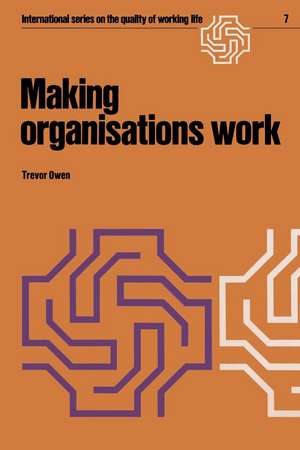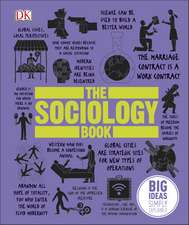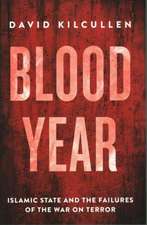Making organisations work: International Series on the Quality of Working Life, cartea 7
Autor Towenen Limba Engleză Paperback – 31 iul 1978
Preț: 380.45 lei
Nou
Puncte Express: 571
Preț estimativ în valută:
72.81€ • 75.92$ • 60.51£
72.81€ • 75.92$ • 60.51£
Carte tipărită la comandă
Livrare economică 20 martie-03 aprilie
Preluare comenzi: 021 569.72.76
Specificații
ISBN-13: 9789020707793
ISBN-10: 9020707795
Pagini: 172
Ilustrații: 184 p.
Dimensiuni: 152 x 229 x 9 mm
Greutate: 0.24 kg
Ediția:Softcover reprint of the original 1st ed. 1978
Editura: Springer Us
Colecția Springer
Seria International Series on the Quality of Working Life
Locul publicării:New York, NY, United States
ISBN-10: 9020707795
Pagini: 172
Ilustrații: 184 p.
Dimensiuni: 152 x 229 x 9 mm
Greutate: 0.24 kg
Ediția:Softcover reprint of the original 1st ed. 1978
Editura: Springer Us
Colecția Springer
Seria International Series on the Quality of Working Life
Locul publicării:New York, NY, United States
Public țintă
ResearchCuprins
1. The Management Energy Crisis.- How we use management energy.- 2. Industry in a Social Perspective.- The aims of Western society.- Living with uncertainty.- Intervention by society into industry.- Ignorance of industry in society.- Turbulence and uncertainty — and individual freedom as well!.- Managing in a democracy.- The location of power in industrial organisations.- The diffusion of power.- Fundamental changes in the management task..- 3. Sources of Energy within the Organisation..- The nature of complex organisations.- The manager at the interface and the sources of energy at his disposal.- Releasing the energy of the working group.- Boundary control.- Second thoughts about boundaries.- Boundaries may shield people from reality.- The work group as an ‘open system’ and the boundary as an infinitely permeable membrane.- 4. Using the Energy Sources.- Co-operation and sharing power.- Ways of avoiding anarchy.- Mutual hostility and mutual trust.- Creating an environment of mutual trust.- Sharing problems and the’ san Andreas Fault’ syndrome.- The pain barrier.- Crossing the pain barrier — or not.- 5. Creating Energy Networks.- False linking pins.- Improving linkages.- Using linkages to create a common framework of perception.- 6. Management Decision Making.- Conflict between the objectives of the organisation and the objectives of individuals within the organisation.- When people seek to avoid decisions.- Finding the right level for decisions to be made.- 7. The Nature of the Management Task and the Problems of Achieving IT.- Is a manager necessary?.- Managers in other cultures.- Conflict in a democratic society and its implication for the manager.- Identifying the maximum area of common purpose.- Letting reality in.- Helpful and unhelpful interventions.-Questions for the manager to put to the group he manages.- 8. Who’s on our Side?.- Evading the pressures of society.- The two different worlds of manager.- Bringing the two worlds closer together.- 9. Come Back Leadership, All is Forgiven!.- The manager as a leader.- Creating a framework of shared values.- Decisions of fact and decisions of stance.- 10. Management Energy — Conservation Plan.















